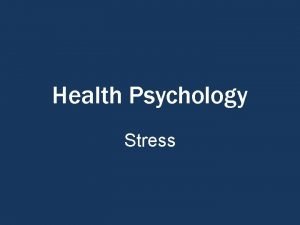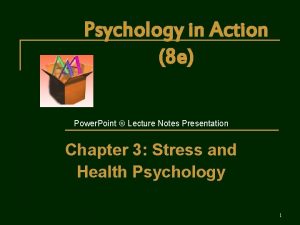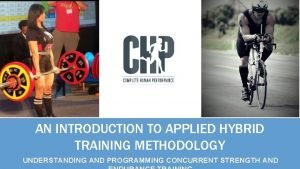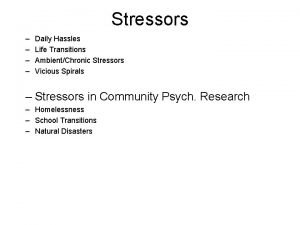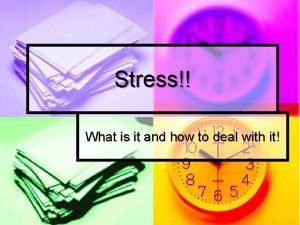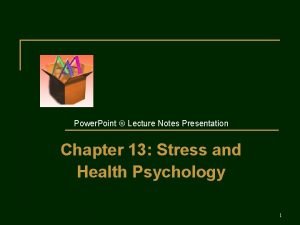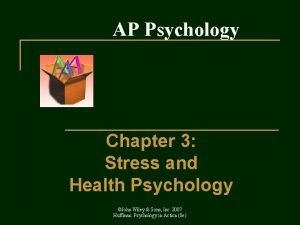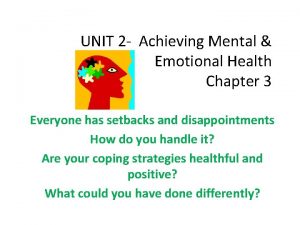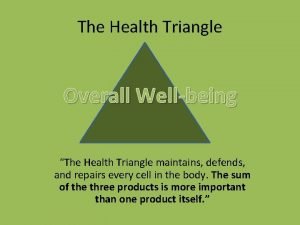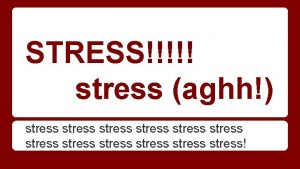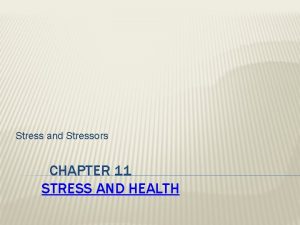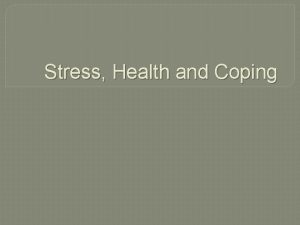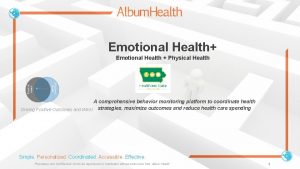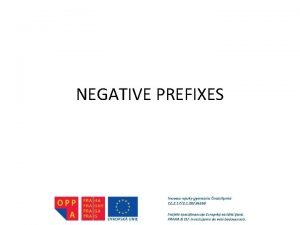Health Psychology Stress Stress Stressors Stress negative emotional










- Slides: 10

Health Psychology Stress

Stress & Stressors • Stress: negative emotional experience, accompanied by various physiological, cognitive, and behavioral changes • Stressors: Cause stress – Noise, violence, pain, job, exams • Stress response: Physiological/psychological changes – Stress hormones, distress • Stress experience: Perception of experience and how we deal with it – Coping – Not always a conscious experience

Stressors • Humans are the only species that can imagine stressors, and their body reacts as if it was real – Robert Sapolsky • Beliefs and expectations play a role in the intensity and character of people’s methods of coping with stressors • Homeostasis: balance between external environment and body’s normal physiological state – When your environment does not cause you stress

Stressors • Acute stressors: appear suddenly, do not last long, call for immediate attention – Physical injuries, attacks – Body is alert and deals with stress, then returns to homeostasis • Chronic stressors: last a long time, constant source of worry – Abusive relationships, bullying, intense jobs – Damages the body overtime – Body does not return to homeostasis because the stressor is always there

Steptoe and Marmot (2003) • Survey on the interaction of social, psychological, and physiological aspects of stress – Seven questionnaires about different stressors – Blood samples taken • Self-efficacy: person’s feeling of competence to deal with a specific task or problem • Perception of control and self-efficacy are important psychological factors in stress • High mean scores on all stressors = higher risk of heart problems, depression, anxiety, etc

General Adaptation Syndrome (GAS) • Hans Selye (1956) • Three staged stress process: – The Alarm Stage • Fight-or-flight response – The Resistance Stage • Coping • Attempting to reverse effects of alarm stage – Exhaustion • Incapable of further coping

Stress & Health • Long-term stress causes an increase in cortisol • Cortisol can lead to: – Depression – Memory problems – Weakened immune system • WHY: Cortisol decreases T-cells (natural killers of infection) • THEREFORE: Individual is more susceptible to infection

Psychoneuroimmunology (PNI) • Based on the assumption that an individual’s psychological state can influence the immune system via the nervous system

Coping Strategies • Folkman and Lazarus (1988) • Problem-focused coping: – Dealing with the stressor itself – EXAMPLE: Quitting a stressful job • Emotion-focused coping: – Handling the emotional aspects of the stress response rather than changing the situation – EXAMPLE: Taking yoga to deal with stresfull job

Coping Strategies • Emotion-focused coping may be effective shortterm, but not in long-term – Can cause addictions like alcoholism if you use alcohol to cope • Thus the term avoidance coping – Individual only wishes to avoid the negative feelings of the stressor than deal with it/fix it • Proactive coping: effort done prior to avoid a stressful experience – Like studying hard for an exam
 Stressors
Stressors Walter cannon observed that a variety of stressors trigger
Walter cannon observed that a variety of stressors trigger Consolidation of stressors
Consolidation of stressors Types of stressors life orientation
Types of stressors life orientation An ambient stressor
An ambient stressor Life stressors
Life stressors Walter cannon observed that a variety of stressors trigger
Walter cannon observed that a variety of stressors trigger Health psychology definition ap psychology
Health psychology definition ap psychology Intentional use of unfriendly or offensive behavior
Intentional use of unfriendly or offensive behavior Health triangle project examples
Health triangle project examples Emotional health and wellbeing framework
Emotional health and wellbeing framework
